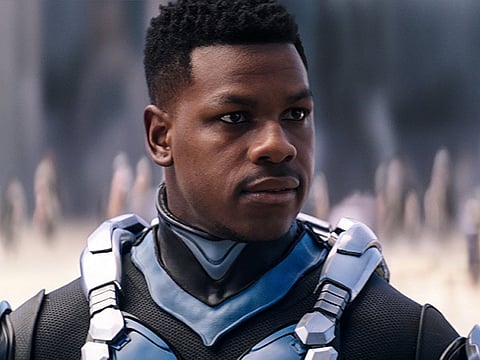‘Pacific Rim Uprising’ review: John Boyega shines in robot reboot
Follow-up improves on Guillermo del Toro’s patchy robots vs monsters adventure

There was a monstrous amount of undeniable glee to be had while watching 2013’s Pacific Rim, a film that played out like a big-budget re-enactment of a seven-year-old smashing his toys together.
A procession of scenes featuring giant robots fighting giant creatures proved gloriously fun to behold, recklessly destructive and fantastically silly. But the rest of the film was hopelessly inert, the humans so staggeringly dull that I’d have been content to see them destroyed underneath a public park-sized slimy claw.
Such B-movie mayhem proved a difficult sell for audiences. It underperformed stateside with just $101 million (Dh370.9 million) in the bank, a problematic result given the $190 million budget, but it was easily translatable overseas and a worldwide total of $411 million (helped mainly by Chinese audiences) meant that a sequel was deemed a worthy pursuit.
The second time around, director Guillermo del Toro has taken a step back with just a producer credit (he’s too busy winning Oscars to be involved in such frippery) and a retooled cast is in place, with John Boyega’s effortless charisma taking over from Charlie Hunnam’s total lack of it.
The Star Wars alumnus plays Jake, the son of Idris Elba’s deceased general from the first outing. He’s a burnout, having left his position in the Jaeger Academy (where plucky recruits train to control those giant robots) and instead makes his money by selling black market scraps left over from the war 10 years prior. But when he’s arrested yet again his sister (Rinko Kikuchi, who remains as unmemorable as she was in the original) steps in and forces him back into his old job, along with a scrappy orphan (newcomer Cailee Spaeny, whose upcoming filmography suggests she is going to be one of the year’s biggest breakouts) he’s picked up along the way.
It’s good timing as, despite the world moving on from the terrifying events before, it looks like it might be about to happen again.
While the film undoubtedly picked up a much bigger audience on the smaller screen there’s still a much-needed “previously on Pacific Rim” opening montage that wisely plays to a new crowd who might have missed the first chapter.
It’s followed by a zippy collection of scenes introducing Boyega’s character, who plays like a slightly less developed cocktail of Han Solo and the Star Trek reboot’s Kirk. There’s a hefty amount of exposition that follows, but it’s indicative of a jargon-heavy script that one has to acclimatise to. The process felt clunkier in Del Toro’s film, but there’s an easier flow this time around.
The film in general moves at a sleeker pace, with more of an actual plot to match the shiny visuals. It’s strange given that Del Toro, a newly minted Oscar-winning director, couldn’t make a more entertaining film than Uprising director Steven S DeKnight, whose credits lie solely on the small screen.
If anything, Del Toro’s overexcitable ambition muddied the focus, while the sequel plays more like the solidly entertaining A-list B-movie we all wanted the first time. While it shares the hyper-realised, lens flare-filled sheen of the Transformers franchise, DeKnight deserves credit for making the large-scale fight scenes feel remarkably coherent, something Michael Bay struggled to do well. In the original many of the bigger showdowns occurred at night which, coupled with some messily choreographed action, meant that they were often a muddle, but DeKnight has wisely shifted the action to daytime and, as a result, it’s easier to engage with the mayhem.
It’s also easier to engage with the humans this time, and that’s thanks largely to another star turn from Boyega, who is rapidly becoming one of the most adept leading men in Hollywood. He’s a commanding, captivating presence, whether it’s delivering a rousing speech or playfully toying with his frenemy, played by a steely, bland Scott Eastwood. It’s also refreshing to see him use his real accent — it’s still surprisingly rare to see a non-plummy voiced British actor lead a film of this scale, and his success in the role will hopefully lead to further instances.
He’s surrounded by a diverse international cast, not all of whom are given much to do (a half-assed love interest is horrendously underwritten) and the film’s clear attempts to appeal to a Chinese audience don’t feel as tokenistic as they have often felt in other blockbusters. There are clearly defined Chinese characters who are allowed to speak in their own language for once (I can’t remember the last film of this scale with so many subtitles) and, in particular, Tian Jing makes a striking impression.
It might drift out of the memory just as easily as it drifted in, but there’s a goofy likeability to Pacific Rim: Uprising, a primal thrill to be had, and a confident slickness behind it that means, despite a nearly two-hour running time, it doesn’t outstay its welcome. DeKnight has already hinted that a cinematic universe could be on the way and given the wafer-thin structure of the plot, that seems like a mistake, so before the waters get muddied once again, switch off and enjoy.
————
Don’t miss it!
Pacific Rim: Uprising will screen across UAE cinemas from March 22
Sign up for the Daily Briefing
Get the latest news and updates straight to your inbox


